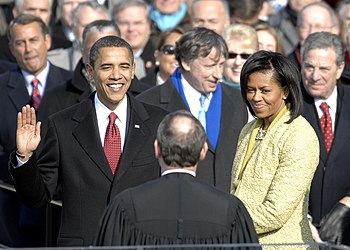 |
| English: Naomi Klein on Thursday, Day 21, of Occupy Wall Street. Klein led an open forum at the event. (Photo credit: Wikipedia) |
 |
| With his family by his side, Barack Obama is sworn in as the 44th president of the United States by Chief Justice of the United States John G. Roberts, Jr. in Washington, D.C., Jan. 20, 2009. (Photo credit: Wikipedia) |
 |
| Historian Howard Zinn speaking in 2009 (Photo credit: Wikipedia) |
 |
| Naomi Klein (Photo credit: Wikipedia) |
Having not read Naomi Klein’s new book This Changes Everything, when I went
yesterday to see the film by the same name made by Klein and her husband Avi
Lewis, I really had no idea what the “this” is that she says changes everything.
I had rather got the impression from reviews of her book that Capitalism is the “this” in question, and
that she is blaming Capitalism for the man-made events that have created the
warming of the Earth in recent decades, which, if continued, seem to be leading
the world to destruction. If true, I
think, this would have been a somewhat questionable assumption, since the same policies have been, and are,
followed by non-capitalist countries, with, in some cases, even worse
results. but a moment comes in the film
when she makes it clear that it is “climate change” and not Capitalism that she
says changes everything.
The film is interesting, excellent even, in that it sets
up the dilemma about this overwhelmingly important and yet difficult-to-grasp
subject in terms that can be understood by everyone. Naomi Klein has always
shown a genius for looking at events from an angle that is quite off-the-beaten
track, as it were, and she has used her extraordinary analytical powers so
successfully that she has become established throughout the world as a major
intellectual, accepted as an equal by no matter how elevated a level of academics,
and one who has, moreover, made no secret of where her political sympathies
lie, that is, with the struggling peoples of this benighted world.
There were two screenings of the film yesterday in
Montreal, the second of which was followed by a community meeting of activists.
But I went to the first one, so as not to have my judgment of the film qua film influenced by the enthusiasms
of others. It was an unusual experience, for it was the first time in my entire
life that I have had a whole cinema to myself. No one else was there. I fought
the impulse to take a message from that about public attitudes to the issue.
The film opens with the Alberta tar sands, said by Klein,
who narrates the film, to be the biggest industrial project on Earth. (Before
she said that, she opened the narration by saying that she had always been
bored by the many films about climate change. This immediately established a
difference between us: I have seen hardly any such films, and didn’t even know
so many had been made. And it really must be damnable to live a life crowded
with such films.)
The thought kept occurring to me as I was led through
Klein’s appalling catalogue of the stupidities of the industrial machine, that
with a bit of a tweak in emphasis, this could have been a comic film, instead
of one overlaid by the tragedy she sees before us. A film of sardonic humour, it is true, about
the inanities of which people are capable, the complete and utter stupidity of
arguments made in favour of our destroying the land, water and air that lies at
the base of all our lives, demonstrating the straight-faced idiocy with which
people in positions of decision-making power can express their utter failure to
grasp what is at stake. As these verities kept coming out of the mouths of
engineers, small-town mayors, workers, businessmen and others, I kept breaking
into hoots of laughter, trying to tell myself sternly that although it was all
very enjoyable, it really is no joke.
Which I guess, brings me on to Klein’s solution, namely,
the uprising of the peoples of this world against the indignities being
perpetrated on them and their lands, just people, protesting, leaderless mobs,
really, angry, confronting the batons, rifles and teargas of their masters. She
takes us around the world from Canada to Greece, from Greece to India, from
India back to the United States, and so on and on, revealing one horror after
another, one official lie after another, one inanity after another in defence
of what they are doing. She even
includes an incredible quote from Barack Obama, the golden-tongued orator, a
man of considerable understanding and intelligence, exulting in how much digging
and shovelling and piping and interference with the processes of nature he has
brought into play.
The Occupy movement that spread so irresistably around the
world a couple of years ago occupies a central place in what seems to be this film’s recommended solutions.
Unfortunately, the Occupies reached their sudden peak, and then, with the onset
of winter, died away. It all reminds me
of the social revolution, as it was called, that overcame the United States in
the 1960s, as young people awoke from the torpor of the Eisenhower years, and
threw off their respect for the timidity of their elders. The end of that was
the election of Richard Nixon, a great triumph for revolution. You can’t help
laughing.
All of this street protesting is great, I guess. Remember,
more than a million people, maybe as many as three million, were in the streets
protesting in advance of the decision to invade Iraq. Even that was not enough:
they were simply ignored by an establishment that had made up its mind a year
before to do the deed.
Similarly, this kind of protest is not new. As the late
Howard Zinn shows in his marvellous Peoples
History of the United States, ever since the republic was established there
has been an active peoples’ opposition to the controls imposed by the elite to
serve their own purposes, right from the signing of the Declaration of Independence, and this opposition has never ceased.
Yet it has never succeeded either, because it has never found the way to
challenge the political control of the wealth-owners and the politicians,
institutions and information systems that are owned by them serve their
interests.
It seems that only political action can take away the
power controlled by these wealth-owners in every country in the world. Although
this seems to me to be an old story --- I have lived longer than Ms. Klein, I
guess, and seem to have always been confronted by these terrors --- there does
seem to be one newish element in her solutions, namely local action, local
political action, community-based action, but even that seems to be ideal only
in confronting specific outbreaks of environmental horrors.
Anyone who doubts the determination of those who own
wealth to hang on it it, and to the privilege of control that goes along with
it, need only consider the tenacity with which the wealth-owners of Europe have
been hanging on to what is theirs. The history of the Syriza uprising in Greece
tells a melancholy story of an entrenched EU oligarchy refusing to abide any
opposition within their neck of the woods. A story that has now been reinforced
by the refusal in recent days of the President of Portugal to allow the
dissenting socialist party that has won the biggest share of the seats, to take
office.
He’s just saying no: you’re not allowed in, no matter what
the voters say.
Of course, if there really was a world-wide political
movement there might be some grounds for hope. It reminds me of what Arundhati
Roy said in one of her surveys of world politics: The only thing about
globalization that is worth supporting is the globalization of dissent.
I guess that is the dream of Ms Klein, too. A great coming
together of all the forces of dissent around the world, to drive the hobgoblins
who are, because of their greed and stupidity, preventing us from doing what we
know has to be done to save the world from burning up.
Well, I guess, it is a hope of sorts. But it does seem a
kind of long shot.
No comments:
Post a Comment